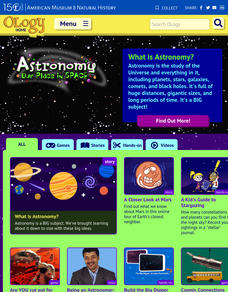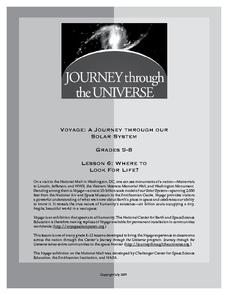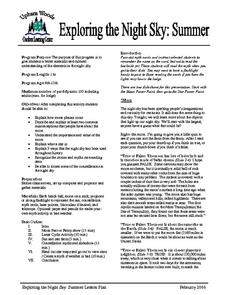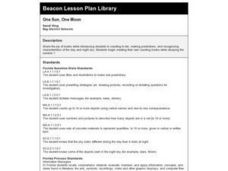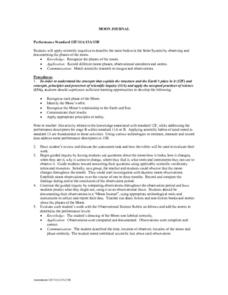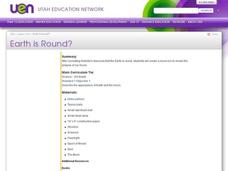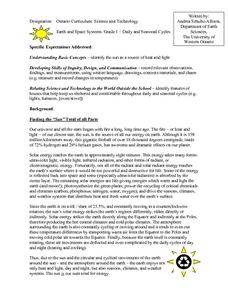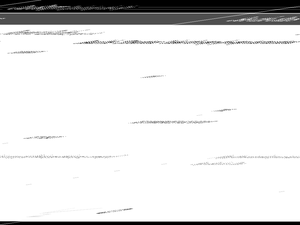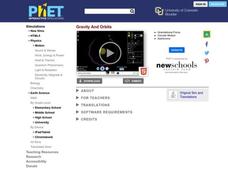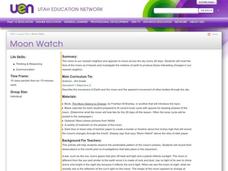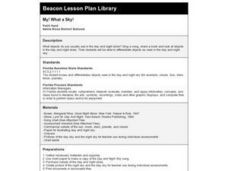Curated OER
Voyage: A Journey through our Solar System
Young scholars build the Voyage scale model of the Solar System on a playground and "travel" to each planet. They recognize that the Sun and planets are tiny worlds in a vast space, giving them a new perspective on the Solar System, and...
American Museum of Natural History
Planetary Mysteries
A website all about planetary mysteries—it's a one-stop-shop for all things, stars, planets, and space travel. Scholars read an astronomy overview to discover the page's big ideas, then choose from the plethora of resources, including...
Journey Through the Universe
Where to Look For Life?
Every year we discover new planets including more than 1,000 in 2016 alone. Will we ever find life on another planet? The lesson includes two activities to help scholars understand this concept. First, they analyze the temperature range...
Curated OER
Exploring the Night Sky: Summer
Students explain how moon phases occur. They describe and explain at least two common misconceptions that people have about the moon. Students explain what a star is. They explain 3 ways that the night sky has been used throughout history.
Curated OER
Why do Stars Rise in the East?
In this stars rise in the east worksheet, students use geometry to show how the Earth rotates from west to east and why celestial bodies appear to rise in the east and set in the west. Students draw a figure and label given points in...
Curated OER
One Sun, One Moon
First graders read "Ten Black Dots" by Donald Crews and then create their own counting books focusing on the number 1 (one) and using yellow dots to represent the sun, moon and stars.
Curated OER
Moon Journal
Fourth graders observe Moon and its features, and record results both in written form and in a drawing on the given template.
Curated OER
Star Child Astronomy
Students gain understanding of the relationship of Earth within the Solar System. They increase knowlegde of the planets, sun, moon, meteoroids, asteroids and comets.
Curated OER
Sunny Symbols
After listening to a series of stories about signs and symbols associated with the United States, pupils discuss the importance of the sun in Native American legends and as a representation of New Mexico. As part of this exploration,...
Curated OER
Earth is Round?
Third graders discuss how Aristotle concluded that the Earth was round. As a class, they review theories about the Earth's shape and describe how life on Earth would be different if it were flat. Individually, they make a moon book in...
Curated OER
Wobbling in Circles
Sixth graders role play the parts of the sun, the moon and the Earth as they simulate the concepts of revolution and rotation. They act out the parts in small groups and discuss the concepts as a class.
Curated OER
Daily and Seasonal Cycles
First graders identify the sun as a source of heat and light. They identify features of houses that help keep use sheltered and comfortable throughout daily and seasonal cycles. Students are told that summer is the best season to...
American Museum of Natural History
What is Astronomy?
Go study the universe. Pupils learn seven aspects about astronomy and astronomers. They begin to learn about constellations; distance and motion between objects; gravity; the electromagnetic spectrum; dark matter and energy; and teams of...
Space Awareness
Know Your Planets
Does your class know their planets? Implement an activity that has them describing the solar system, identifying properties of the planets, and placing them in order from their distance from the sun.
Curated OER
See the Stars
Students explore the nighttime sky. In this space science lesson plan, students read the book Maria's Comet and and investigate the sky using their naked eyes. Students compare the view of their naked eyes to the view of a telescope.
Curated OER
The Sun Affects Earth
Third graders read, write, and listen to information about the sun and its effects on the Earth.as it relates to its axis, orbit, rotate, and revolution. In this solar system lesson, 3rd graders examine how the sun effects the Earth's...
PHET
Gravity And Orbits
Have you ever wanted to turn off gravity? This simulation allows learners to do just that in addition to altering other variables. Scholars can move the sun, Earth, moon, and space station to see how distance affects gravitational pull....
Curated OER
Moons
Students practice rote counting to 20. After a lecture about the planets and the moons that surround them, they identify the number of moons surrounding various planets. Students compare and contrast the quantity of moons surrounding...
Curated OER
Moon Watch
Third graders read books about the moon and discuss its perceived changes as it moves across the sky. They observe the moon over the course of a month and chart their observations. They discuss their observations and conduct further...
Curated OER
Exploration of the Moon
In this moon worksheet, high schoolers review the Clementine exploration of the Earth's moon. This worksheet has 8 matching and 14 true or false questions.
Curated OER
Who Wants to be a Millionaire: Solar System
Fourth and fifth graders will love showing what they know about the planets and our solar system. This game is fashioned after "Who Wants to be a Millionaire" and has the class work through fifteen different solar system related...
Keep it Simple Science
The Earth in Space
Skim the surface of the earth with this brief, compact, summary of outer space. The sun, stars, galaxies, planets, and phases of the moon can be found in this all-in-one resource. Seventh graders will enjoy these simple worksheets to do...
Curated OER
My! What a Sky!
First graders read "Goodnight Moon" or "Day And Night" and discuss what they see in day and night skies. They read and sing lyrics to the "Day and Night" song. They identify objects in the sky as day or night objects. They illustrate day...
Curated OER
The Sky Jeopardy
First graders reinforce concepts about sun, moon, day, night and sky by playing the Sky Jeopardy game. In the end, 1st graders get to nibble crackers in order to show the different phases of the moon.



